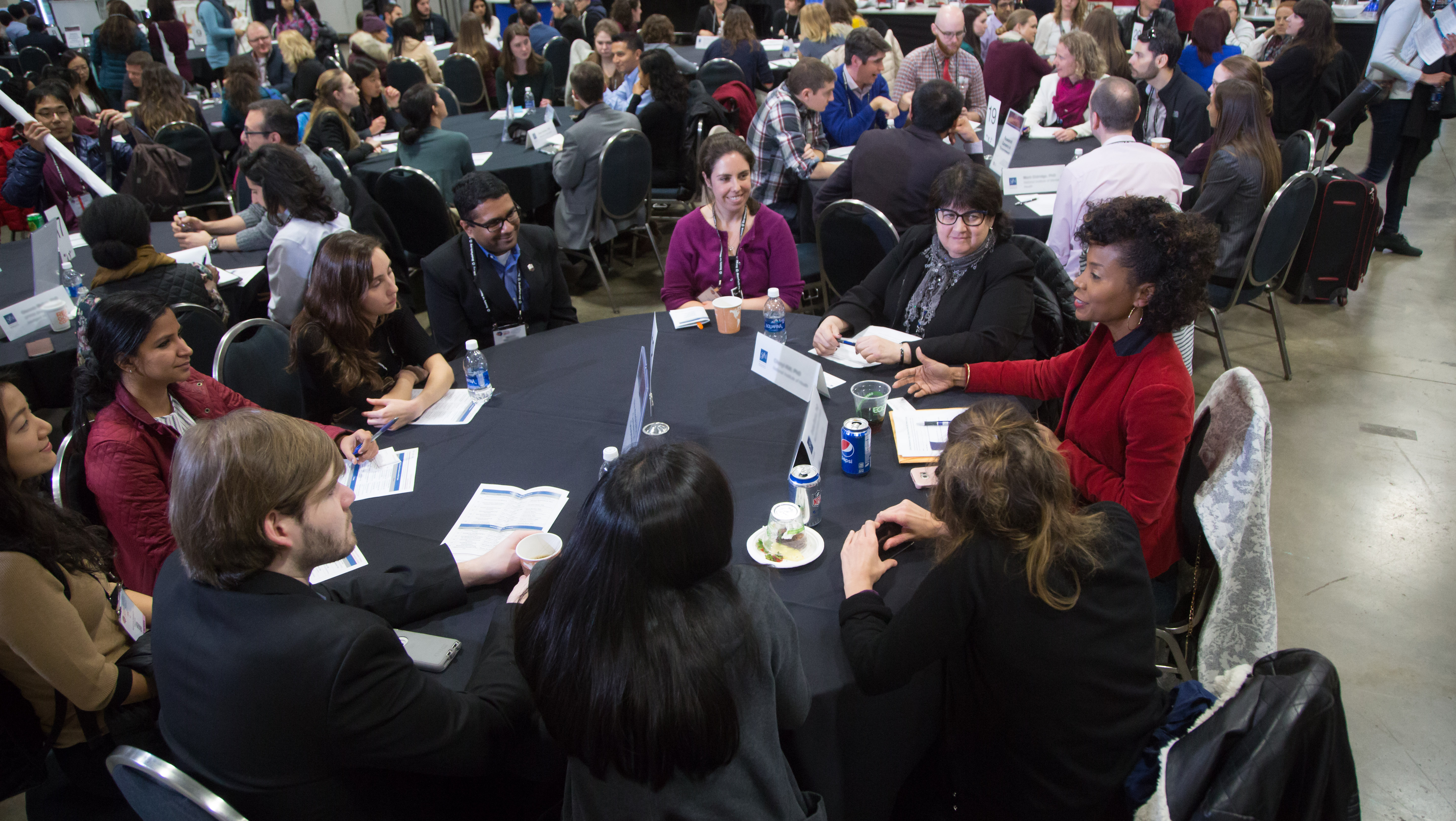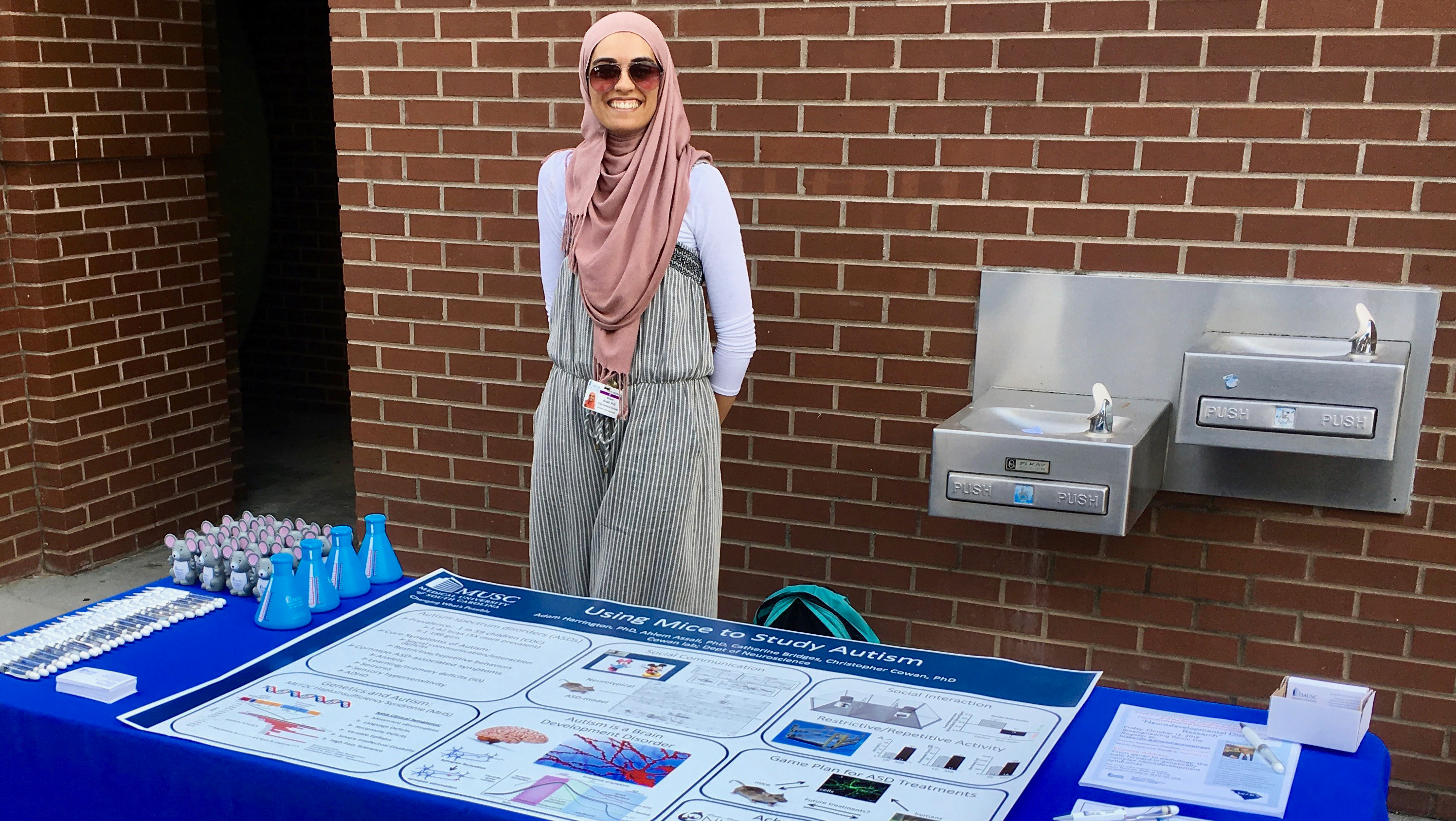
SfN Helps Neuroscientists to Succeed in Any Career Path
 “Career Development Topics: A Networking Event” is one of many events offered at SfN’s annual meeting that encourages attendees to collaborate and share experiences that can help them in their careers.
“Career Development Topics: A Networking Event” is one of many events offered at SfN’s annual meeting that encourages attendees to collaborate and share experiences that can help them in their careers.A new report from the National Academies of Sciences, Engineering, and Medicine, The Next Generation of Biomedical and Behavioral Sciences Researchers: Breaking Through, responds to trends in the field that threaten the next generation of neuroscientists in their career development and ability to make scientific discoveries that advance the field.
The report presents findings of a study examining programs and policies to create opportunities for successful transitions to independent research careers, commissioned by a committee representing academia, government, and industry and overseen by the Board on Higher Education and Workforce. It identifies barriers within the U.S. biomedical research system that preclude creativity and recommends ways in which Congress, public and private research institutions, and the biomedical industry can work together to increase transparency, promote continued innovation in basic science, and ensure scientific progress that extends well into the future.
Study director and report coeditor Lida Beninson noted that the impetus of the report is “unique, in that it was written into the 2016 Appropriations Act and had bipartisan backing in the Senate. This provided a clear signal that the health of our biomedical research workforce, particularly regarding young investigators, is a national priority.”
Several longstanding challenges were brought to light: Many newly awarded biomedical PhDs, MDs, and MD-PhDs spend long periods in postdoctoral positions with low salaries and few opportunities for independent research or professional advancement. Additional issues include limited academic career opportunities, a lack of transparency about career outcomes, and declining federal research funding. Among other recommendations, the report calls for incentives for innovative science and designing training programs to support the next generation of basic and biomedical researchers.
According to Gary McDowell, a member of the committee that drafted the report and executive director of the nonprofit organization Future of Research (FoR), which advocates on behalf of young investigators, “Early career scientists need to be aware of the reality that this hypercompetitive system can be predisposed to frustrate their independent goals.”
“We hope to give early career scientists hope that they can focus their minds on solving problems, not just on getting the next grant,” he said.
Training Across a Career
Through a number of programs, the Society provides the global community of neuroscientists with access to high-quality programming on emerging topics. This programming supports the training and professional advancement of researchers at all stages of career development and is addressing long-standing challenges identified in the report.
“It has become clear that forging a career in the neurosciences and more broadly in the biomedical sciences requires intentional planning, guidance, and support,” said Elisabeth Van Bockstaele, chair of SfN’s Neuroscience Training Committee (NTC) and dean of Drexel University’s Graduate School of Biomedical Sciences and Professional Studies. “SfN is taking a leadership role in helping trainees succeed in their professional goals by providing high-quality online programming in rigorous scientific training and purposeful career development planning.”
To extend digital learning opportunities to neuroscientists around the world, SfN this year piloted an optogenetics training series comprising eight complementary digital modules available on Neuronline, SfN’s learning and discussion website, as well as a virtual conference. Created by more than 40 global leaders in neuroscience, the series offers researchers an opportunity to enhance their understanding of tools and applications in one of today’s most rapidly growing technologies.
The Best Practices Working Group of the NTC additionally works to develop year-round Neuronline programming that expands the reach and impact of neuroscience training resources. Since 2015 it has developed three to four webinars per year on topics including career planning, international training programs, innovative curriculum design and recruitment strategies, and more.
Neuronline also features an extensive collection of resources for early-, mid-, and advanced-career scientists that cover topics including a variety of Career Paths. Resources in this collection connect readers to career options in academia, government, nonprofit work, public policy and advocacy, pharmaceuticals and biotechnology, science writing, publishing, and more. Additionally, SfN has published two of a four-part series of Career Skills Toolkits. These resources are intended to build skills such as leadership, management, and science communications that are essential for neuroscientists regardless of their career pathway.
Collaboration and Networking Opportunities
SfN’s training resources share many of the objectives of the NIH consortium Broadening Experiences in Scientific Training (BEST), which enhances training opportunities for early-career scientists that prepare them for both academic and nonacademic career options. BEST comprises 17 institutions that collaborate to improve biomedical career development through empowering trainees to develop their career-related skills. “We need a cultural change in graduate education, with thesis advisers playing a broader role in mentoring their students, not only in the lab, but also with respect to professional development and career exploration,” said Victoria Prince, dean of graduate affairs in the Biological Sciences Division at the University of Chicago, a BEST institutional research site.
Prince added, “Whatever career goals a trainee has, their success will likely depend on effective networking, and large professional societies like SfN can play a key role in enabling that process by connecting members nationally and internationally.”
To provide trainees with opportunities to network with senior scientists and participate in learning opportunities at the annual meeting, SfN supports students with Trainee Professional Development Awards. The awards fund travel to the annual meeting for abstract presenters and are available to undergraduate and graduate students and postdoctoral fellows demonstrating scientific merit and excellence in research.
In addition, the Neuroscience Scholars Program provides mentoring and professional development opportunities as well as travel to the annual meeting for underrepresented graduate students and postdoctoral researchers, while the Latin American Training Program provides a unique training opportunity for young investigators from across Latin America and the Caribbean in that region, as well as support to attend the annual meeting. Beyond in-person programming, both programs also include a year-round online learning component.
Programming at Neuroscience 2018
At Neuroscience 2018 in San Diego, Van Bockstaele and Rosalind Segal, incoming chair of the NTC, will host the fourth Neuroscience Departments and Programs Workshop on Sunday, November 4, from 2:30–5 p.m. The workshop will focus on aspects of the National Academies report that relate to strategies for ensuring the successful launch and sustainment of careers in the biomedical sciences, especially through the development of postdoctoral training programs.
Titled Breaking Through: Pathways to Independence for Early Career Neuroscientists, the workshop will feature speakers including Kenneth Maynard of Takeda Pharmaceuticals, Inc., an SfN councilor and a member of the committee that drafted the report; and Letitia A. Weigand of the National Cancer Institute, who will provide an NIH perspective on the report. The workshop also will invite graduate students and postdoctoral fellows, faculty and administrators, and industry representatives to participate in small-group discussions around new forms of training to support the launch of independent careers and provide a dedicated opportunity for networking among attendees.
The Next Generation
By working with their institutions to incorporate recommendations of the National Academies report and by making use of SfN resources, SfN members worldwide can help to empower talented scientists across career stages to pursue creative research and rewarding careers in neuroscience. Read the report, available as a free download, and explore career resources on SfN.org.



















